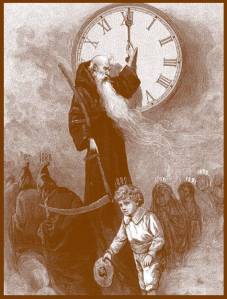We humans have various ways of orienting ourselves in time. Some people seem to live in the past while others are oriented towards the future. Then we have the “live in the moment” types who believe we should look neither backward nor forward but concentrate only on the here and now. Because prestigious philosophies such as Buddhism promote this “being here” attitude as a form of great wisdom, the latter group often see themselves as uniquely enlightened.

Father Time may relentlessly march on, but people relate to time in different ways. (public domain image)
People of all kinds and ages fall into each of the orientations, but there are some groups where folks are more likely to have one preference or another. The elderly are most likely to spend a lot of time thinking about the past. They love to look back on their long lives and fondly remember the good times or shed a tear over some lasting sorrow. Reminiscing at length with anyone who will listen is a favoured pastime. You know, chatting about “the good old days.”
Among the backward looking younger set, the attraction is a seemingly simpler and presumably less-stressful way of life or a romanticized vision of the merits of some particular era. As a young man, C. S. Lewis, author of The Chronicles of Narnia, acquired a fondness for the Middle Ages and came to regard the modern disdain for the religious “Dark Ages” as obnoxious “chronological snobbery.” These people prefer old houses with “character,” love vintage cars, buy antique furniture, enjoy films and novels set in the past, and in concert with some of the elderly, believe things were once better than they are now. Humanity is in a fallen state. There was once a “golden age” of art, manners, spirituality, or what have you. The general mental tone is one of gentle longing for what is remembered but otherwise “lost.”
In sharp contrast, forward lookers see the past as largely inferior and something we should gladly leave behind. They believe in progress, think the world is quite decent as it stands (or entirely improvable), and expect things to get even better farther down the road. These folks tend to be goal setters and anticipators. Why is Apple taking so long to release their new whatsit? What is new and hot this month? Things will be so much better when such and such is improved. Here, the mental tone is a state of slightly impatient expectation.
Novelist John Buchan has his famous lawyer Edward Leithen say something important about this in, The Gap in the Curtain. He is illuminating the need for a future oriented way of looking at life. “… I wanted some plan and policy in my life, for I couldn’t go on living in the mud of the present. My mind needed prospect and horizon … I told myself that I was beginning to be cured of my weariness, for I was growing discontented, and discontent is a proof of vitality.”
Furthermore: “I … thought of them … as spectators on a ridge, trying to guess what lay beyond the next hill … I must recapture the mood for this guessing game, for it was the mainspring of effort and therefore of happiness.”
(As an interesting aside here, let me mention that the political theorist and philosopher Hannah Arendt claimed that just as memory is the mental organ of the past, so the will is the mental organ of the future.)
Dwellers in the here and now fall into two surprisingly different yet oddly similar groups.
The first are spiritually minded types who seek a superior way of relating to the world. They see backward looking longing and forward looking impatient expectation not as legitimate forms of emotional motivation to act but as uncomfortable states of mind that must be overcome in order to achieve peaceful enlightenment. Buddhism offers an ancient path to this passive way of relating to time and the world. Buddha speaks of “being here” in the Arañña Sutta of the Samyutta Nikaya:
They sorrow not for what is past,
They have no longing for the future,
The present is sufficient for them:
Hence it is they appear so radiant.
By having longing for the future,
By sorrowing over what is past,
By this fools are withered up
As a cut down tender reed.
The second here-and-now group are unambitious easygoing “take life as it comes” types who neither care about the past nor worry about the future. They are like the happy-go-lucky grasshopper in the old Walt Disney cartoon, “The Grasshopper and the Ants.” But note how similar the grasshopper is to a traditional Buddhist monk who relies on others to provide him with food and shelter. One might suggest that happy-go-lucky folks are well down the road to being natural Buddhists!
I am a future oriented type myself and regard this as the best way to be. Nevertheless, I think everyone must find their innate way of relating to time and then live wholeheartedly within that perspective.
Interesting.
This is partly relevant: I once read a book – forgotten the title – full of quotes going back into history about how people are forever harking back to an illusory crime free golden age, about the cheekiness of the younger generation in the current age, etc. It may have been called ‘Hooligan’ as part of the title.
I remember reading such a book myself, Lucinda, but also cannot recall the title. One source of such “golden age” thinking comes from older people who are prone to believing things were somehow better when they were young. My old Mom, for example, is adamant that teens were more respectful and polite in her day than they are today. The evidence for this is scant, to say the least, but memory is selective and the farther back we go, the more likely we are to recall only the best bits.